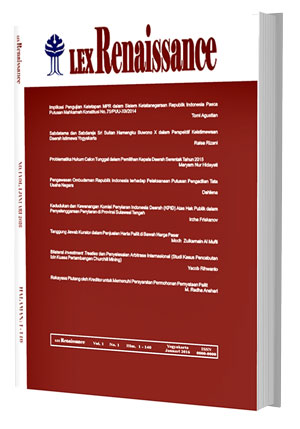Main Article Content
Abstract
This research is reviewed from Law No. 1 of 1974 on Marriage (Marriage Law) and Presidential Decree No. 1 of 1991 on Compilation of Islamic Law. Positive Law and Islamic Law only recognize open monogamous marriages, but it does not rule out the possibility for a husband to have a polygamy marriage with the conditions as stated in Article 4 paragraph (2) of the Marriage Law by submitting an application to the Religious Court. The problem formulation is first, how is the application of shared assets in polygamy marriages in Indonesia? Second, how is the legal protection of assets in the polygamy marriage agreement? This research is a normative-juridical study with the aim of finding the coherent truth. The distribution of shared assets in a polygamy marriage is based on an agreement between husband and wife. The first wife is entitled to assets obtained from the marriage between the husband and the second wife, but the second wife is not entitled to the assets of the first husband and wife. To guarantee legal protection for the shared assets, a prenuptial agreement between husband and wives can be concluded so that the problems do not arise in the future. With the prenuptial agreement, positive law and Islamic law protect the rights of the wife, especially regarding the assets obtained during the marriage.
Keywords
Article Details
Authors who publish with this journal agree to the following terms:
a. Authors retain copyright and grant the journal right of first publication with the work simultaneously licensed under a Creative Commons Attribution License that allows others to share the work with an acknowledgement of the work's authorship and initial publication in this journal.
b. Authors are able to enter into separate, additional contractual arrangements for the non-exclusive distribution of the journal's published version of the work (e.g., post it to an institutional repository or publish it in a book), with an acknowledgement of its initial publication in this journal.
c. Authors are permitted and encouraged to post their work online (e.g., in institutional repositories or on their website) prior to and during the submission process, as it can lead to productive exchanges, as well as earlier and greater citation of published work (See The Effect of Open Access).References
- Buku
- Asan, M. Iqbal, Pokok-Pokok Materi Metodologi Penelitian dan Aplikasinya, cetakan ke-I, Ghalia Indonesia, Bogor, 2002.
- Ibrahim, Jhony, Teori Dan Metodologi Penelitian Hukum Normatif, cetakan ke-III, Banyumedia Publishing, Malang, 2007.
- Muhammad, Abdulkadir, Hukum dan Penelitian Hukum, cetakanke-I, Citra Aditya Bakti, Bandung, 2004.
- Satrio, J., Hukum Harta Perkawinan, Citra Aditya Bhakti, Bandung, 1993.
- Sjaifurrachman dan Habib Adjie, Aspek Pertanggungjawaban Notaris dalam Pembuatan Akta, Mandar Maju, Bandung, 2011.
- Soemitro, Ronny Hanitijo, Metodologi Penelitian Hukum dan Jurimetri, Ghalia Indonesia, Jakarta, 1990.
- Sumardjono, Maria S.W., Metodologi Penelitian Ilmu Hukum, Universitas Gadjah Mada Press, Yogyakarta, 2014.
- Syarifuddin, Amir, Hukum Perkawinan Islam di Indonesia, Kencana, Jakarta, 2011.
- Victor M. Situmorang, Aspek Hukum Akta Catatan Sipil di Indonesia, Sinar Grafika, Jakarta, 1996.
- Peraturan Perundang-undangan
- Undang-Undang Nomor 1 Tahun 1974 tentang Perkawinan.
References
Buku
Asan, M. Iqbal, Pokok-Pokok Materi Metodologi Penelitian dan Aplikasinya, cetakan ke-I, Ghalia Indonesia, Bogor, 2002.
Ibrahim, Jhony, Teori Dan Metodologi Penelitian Hukum Normatif, cetakan ke-III, Banyumedia Publishing, Malang, 2007.
Muhammad, Abdulkadir, Hukum dan Penelitian Hukum, cetakanke-I, Citra Aditya Bakti, Bandung, 2004.
Satrio, J., Hukum Harta Perkawinan, Citra Aditya Bhakti, Bandung, 1993.
Sjaifurrachman dan Habib Adjie, Aspek Pertanggungjawaban Notaris dalam Pembuatan Akta, Mandar Maju, Bandung, 2011.
Soemitro, Ronny Hanitijo, Metodologi Penelitian Hukum dan Jurimetri, Ghalia Indonesia, Jakarta, 1990.
Sumardjono, Maria S.W., Metodologi Penelitian Ilmu Hukum, Universitas Gadjah Mada Press, Yogyakarta, 2014.
Syarifuddin, Amir, Hukum Perkawinan Islam di Indonesia, Kencana, Jakarta, 2011.
Victor M. Situmorang, Aspek Hukum Akta Catatan Sipil di Indonesia, Sinar Grafika, Jakarta, 1996.
Peraturan Perundang-undangan
Undang-Undang Nomor 1 Tahun 1974 tentang Perkawinan.




